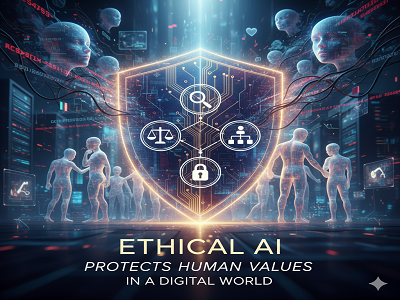Can Ethical AI Protect Human Values in a Digital World?
PUNE /
Aug. 25, 2025 /
THE INSIGHT PARTNERS

As artificial intelligence transforms every aspect of our lives, a critical question emerges: How do we harness its power without sacrificing our values? Ethical AI isn't just a passing trend; it's the essential compass guiding us through the complex intersection of innovation and responsibility. In this blog, we explore how nations like Cambodia and institutions worldwide are leading the charge to make Artificial intelligence not only smarter but also fairer, safer, and more human-centered.
Cambodia's National AI Readiness
As per the new article published by Reuters, Cambodia has taken a significant step forward by completing its national AI Readiness Assessment. This initiative was guided by UNESCO's Ethics of Artificial Intelligence Readiness Assessment Methodology (RAM).
The initiative involved over 300 stakeholders. These included government agencies, academia, and civil society, which collaborated to create a human-centered and rights-based AI strategy.
The report highlights Cambodia's progress in developing legal frameworks and pilot projects like Khmer Braille and Sarika AI. These promote inclusivity and accessibility through ethical AI principles.
Despite challenges in infrastructure and AI literacy, Cambodia's commitment to ethical AI governance sets a strong example. It shows how other nations can ensure AI development remains transparent and responsible.
Embedding Ethical AI in Higher Education
Education is vital in fostering ethical AI practices. According to Dr. Aviva Legatt, many higher education institutions are adopting AI tools without comprehensive strategies to teach ethical AI use.
The 2025 EDUCAUSE study shows a gap between faculty readiness and student AI use. This raises concerns about academic integrity and ethical understanding.
To address these issues, organizations like Grammarly and SAS are incorporating tools that detect transparency and bias. These tools help facilitate ethical AI decisions in educational contexts.
In the case of Grammarly, they have an Authorship tool. It allows educators to detect AI-assisted content. This creates opportunities for educators to identify misuse and ultimately promote learning.
The University of Delaware's "Study AIDE" project offers another glimpse into the power of ethical AI to transform learning. This project merges the options of data integrity, faculty oversight, and student consent. It offers an AI-powered study tool based on AI ethics and embodies how innovation can exist with responsibility.
Why Ethical AI Matters
AI systems are only as neutral as the designers and users behind the systems. In sensitive fields like healthcare, the stakes are especially high as outlined in the
Artificial Intelligence in Healthcare Market Report, the rapid expansion of AI requires ethical frameworks to ensure safety and fairness.
If there are no strong ethical AI frameworks present, technologies could continue to be biased. They may also exploit users, breach privacy, and cause harm to society.
More frequently, employers want graduates who can think critically about the ethical implications of AI. They are developing skillsets around AI ethics reasoning. This proves to be a critical competency for our workforce of the future.
Countries like Cambodia and universities such as Delaware are illustrating best practices in instilling ethical AI. This helps to develop trust in the endemic use of AI and grow equity in access to services and opportunities made available through the increased use of AI.
It also helps develop and create pressure for sustainability in the use of AI. When we consider, as Dr. Legatt highlights, embedding ethical AI into educational and governance contexts will influence the AI landscape and society at large.
The Path Forward: Collaboration and Commitment
To achieve AI ethics, we need collaboration all of us working together, whether it be governments, universities, businesses, or communities.
Through open dialogue, clear policies, and public awareness, we can address issues that continue to challenge us. These include gaps in infrastructure, gender inclusion, and a lack of AI literacy.
UNESCO's global commitment to AI ethicswith nearly 70 countries participatingalong with Cambodia's national strategy and unique education programs, demonstrates the growing global commitment towards AI ethics.
Conclusion
The emergence of AI brings with it incredible opportunities. However, it also raises some tricky ethical questions.
Looking at Cambodia's efforts to get ready for AI and the emphasis on ethical considerations in higher education shows us just how important it is to align AI advancements with ethical standards.
By putting ethical AI at the forefront, we can work towards a future that is fair, inclusive, and sustainable one that harnesses technology while honoring human rights and values.
References
Forbes-
An AI Ethics Roadmap Beyond Academic Integrity For Higher Education
UNESCO-
Cambodia Launches AI Readiness Assessment Report to Guide Ethical and Inclusive Digital Transformation

.png)
.png)



.png)
.png)
.png)